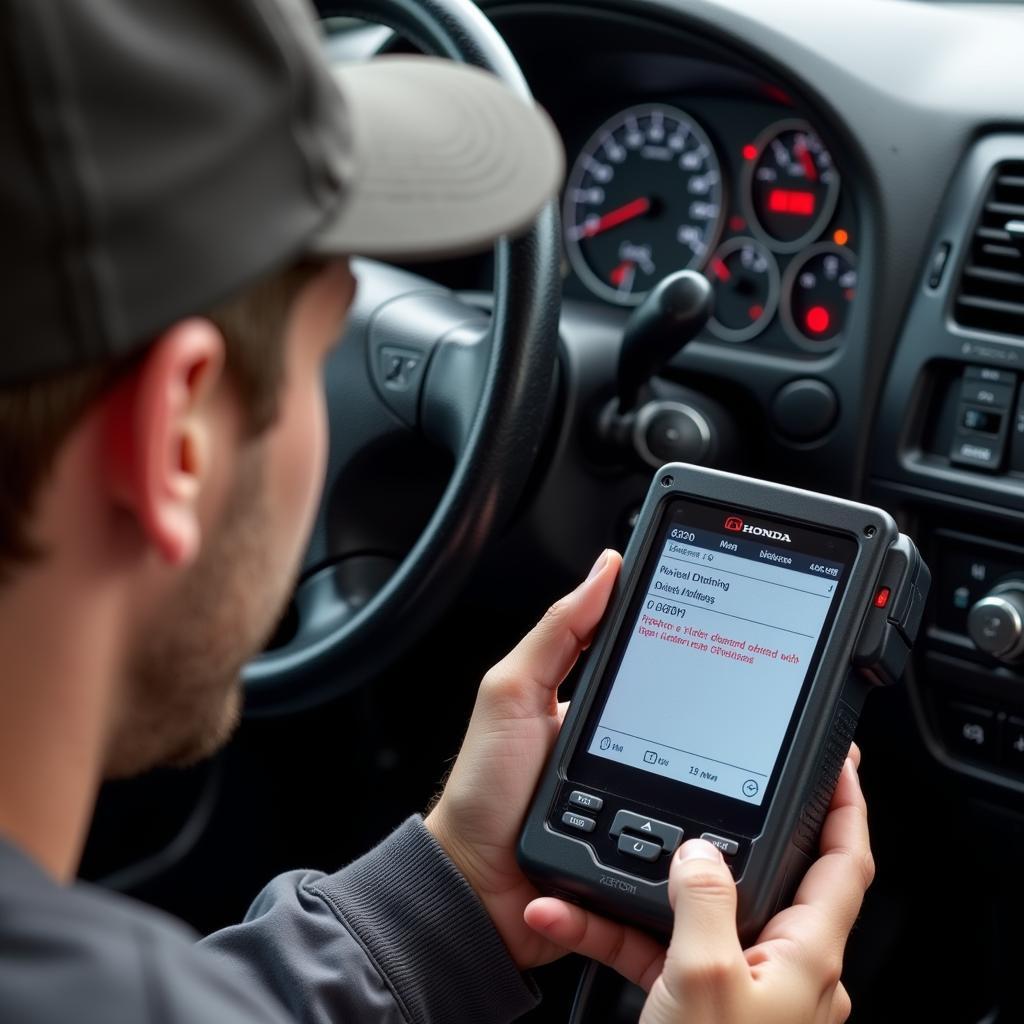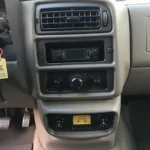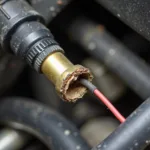Dealing with a blinking check engine light and a P0300 code in your 1998 Honda CRV? You’re not alone. This common OBD2 trouble code indicates a random misfire, which means one or more of your cylinders aren’t firing properly. This article guides you through the potential causes, symptoms, diagnosis, and fixes for a P0300 code in your ’98 CRV.
While this guide provides comprehensive information, remember that diagnosing car problems requires specific knowledge and tools. If you’re unsure about any step, it’s always best to consult a qualified mechanic.
What Does the P0300 Code Mean in a 1998 Honda CRV?
A P0300 code, specifically “Random/Multiple Cylinder Misfire Detected”, in your 1998 Honda CRV indicates that the engine control module (ECM) has detected that at least one cylinder isn’t firing consistently. This is different from codes like P0301, P0302, P0303, or P0304, which point to misfires in specific cylinders.
Symptoms of a P0300 Code in a 1998 CRV
Recognizing the symptoms of a P0300 code can help you address the problem quickly. Here are some common signs:
- Illuminated Check Engine Light: This is often the first and most obvious sign.
- Rough Engine Idle: Your CRV might shake or vibrate noticeably while idling.
- Engine Hesitation or Stumbling: You may feel a lack of power or jerking when accelerating.
- Reduced Fuel Economy: Misfires waste fuel, leading to decreased mileage.
- Engine Backfiring: This produces a popping sound from the exhaust.
- Failed Emissions Test: A P0300 code can certainly cause your CRV to fail an emissions test.
Common Causes of a P0300 Code in a 1998 Honda CRV
The P0300 code can stem from various issues, often interconnected. Here’s a breakdown of the most common culprits:
- Spark Plugs and Wires: Worn-out spark plugs are a leading cause of misfires. If your spark plugs are old, worn, or have an incorrect gap, they may not be creating the spark needed to ignite the fuel. Similarly, damaged or worn spark plug wires can disrupt the electrical current, causing misfires.
- Ignition Coils: Faulty ignition coils can’t provide the necessary spark to the spark plugs.
- Fuel System Issues: Problems with fuel delivery, such as a clogged fuel filter, malfunctioning fuel injectors, or a weak fuel pump, can disrupt the air-fuel mixture needed for proper combustion.
- Vacuum Leaks: Leaks in the vacuum system can disrupt the air-fuel ratio, causing misfires.
- Oxygen Sensor Issues: A faulty oxygen sensor can provide inaccurate data to the ECM, impacting the air-fuel mixture and leading to misfires.
- Catalytic Converter Problems: While less common, a restricted or failing catalytic converter can cause pressure to back up into the engine, contributing to misfires.
How to Diagnose a P0300 Code in a 1998 Honda CRV
Here’s a step-by-step guide to diagnose the cause of the P0300 code:
- Read the Code: Use an OBD2 scanner 1998 honda crv obd2 port location to verify the P0300 code and check for any other codes stored in the ECM.
- Inspect the Spark Plugs and Wires: Examine the spark plugs for signs of wear, damage, or fouling. Also, inspect the spark plug wires for cracks, burns, or loose connections.
- Test the Ignition Coils: Use a multimeter to test the resistance of the ignition coils. If the resistance is outside the specified range, replace the faulty coil(s).
- Check for Vacuum Leaks: Listen for hissing sounds and visually inspect vacuum hoses and connections for signs of leaks.
- Inspect the Fuel System: Check the fuel filter for clogs, and consider having the fuel pressure tested to rule out fuel delivery problems.
- Examine the Oxygen Sensors: A scan tool can be used to monitor oxygen sensor readings and determine if they are functioning correctly.
- Inspect the Catalytic Converter: Check for signs of blockage or damage. A professional mechanic might use a pressure gauge to test backpressure.
How to Fix a P0300 Code in a 1998 Honda CRV
The repair for a P0300 code depends entirely on the underlying cause. Here are solutions based on the common issues discussed earlier:
- Replace Spark Plugs and Wires: If the spark plugs are worn or damaged, replace them with the recommended type for your engine. It’s also a good idea to replace the spark plug wires simultaneously.
- Replace Faulty Ignition Coils: If testing reveals a bad ignition coil, replace it. It’s often cost-effective to replace all ignition coils at the same time, especially if they are original to the vehicle.
- Address Fuel System Issues: This might involve replacing the fuel filter, cleaning or replacing fuel injectors, or even addressing a failing fuel pump.
- Repair Vacuum Leaks: Replace any cracked or damaged vacuum hoses, and ensure all connections are tight.
- Replace Faulty Oxygen Sensors: If the oxygen sensors are not providing accurate readings, they will need to be replaced.
- Address Catalytic Converter Issues: A clogged or damaged catalytic converter may need to be replaced.
Important Note: After addressing any potential cause, it’s crucial to clear the codes using an OBD2 scanner and then test drive your CRV to see if the P0300 code returns.
Expert Insights
“While a P0300 code might seem daunting, systematically diagnosing the problem is key,” says John Smith, ASE-certified master mechanic with over 20 years of experience working on Honda vehicles. “Start with the most common causes, like spark plugs and wires, then work your way through the system. Remember, regular maintenance is the best way to prevent these issues in the first place.”
1998 Honda CRV P0300 Code: FAQs
Q: Can I drive my 1998 Honda CRV with a P0300 code?
A: While you might be able to drive short distances, it’s not recommended. Driving with a P0300 code can lead to further engine damage, reduced fuel economy, and potentially leave you stranded.
Q: How much does it cost to fix a P0300 code in a 1998 Honda CRV?
A: The cost can range from under $100 for simple fixes like spark plugs to over $1,000 for major repairs like a new catalytic converter.
Q: Can bad gas cause a P0300 code?
A: While rare, contaminated fuel can cause misfires. If you suspect bad gas, adding a fuel system cleaner might help, but in some cases, you might need to drain and refill the tank.
Need More Help?
We hope this comprehensive guide helps you tackle the P0300 code in your 1998 Honda CRV. If you still have questions or need further assistance, our team of automotive experts is just a message away. Contact us via WhatsApp at +1(641)206-8880 or email us at [email protected]. We’re here to help you get back on the road safely!


